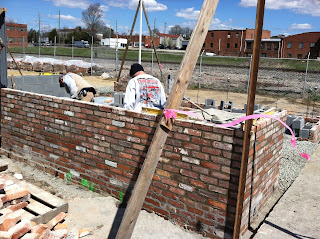It occurred to me many years ago that we are living at too fast a pace. Just a few human generations ago, the fastest person on Earth rode a horse.
We count our travel time coast to coast in hours now, not months. We 'run to the store' to grab ingredients for dinner and often are able to return in time to add them in just a few minutes, really. If there's no cream for coffee, we can set the brewer to make a pot and by the time it's done, we're back with a carton of half and half.
My wife and I have lived remotely for many years and with $4/gallon fuel, each trip to the store costs $10 extra. There's no way we're going to do that, so we plan ahead and don't make 'quick trips' to the store.
A while back, our friend Kaitlyn gave us this amazing World War 1 vintage waffle iron and we made waffles last weekend with it. Karen dug up her recipe and set out to assemble the ingredients while I heated up and oiled the very well seasoned, heavy cast iron kitchen appliance. We keep a full pantry (very full, actually) so there is no running quickly to the store necessary for us.
Our meals proceed at the human pace and are usually begun by prepping with a good sharp knife, then stirred by wooden spoons and usually cooked in a cast iron vessel of some sort. Old ones. We have an enviable collection of beautiful cast iron skillets, Dutch ovens, cornbread and muffin pans, griddles and this incredible waffle iron.
It takes about 5 minutes to cook a waffle and just a moment to pick it off the perfect non-stick finish, created over decades of use and love. Then the waffle is placed into the oven to stay warm until they're all done and it's time to eat.
One at a time, it would have taken a long time to cook enough waffles for a working family on a cold morning a hundred years ago on a wood heated cook stove. It also took a lot of skill to keep the heat just right and the batter just right so that things wouldn't stick or burn. Folks took the time to learn the skills then because they couldn't just go out and buy a plug in electric teflon waffle iron.
When I am dust, my waffle iron will still work and that feels good to me. I hope the people that end up with it when we're gone appreciate it as much as we have. Would you feel good with a Mickey Mouse waffle iron, really? I don't think this one would last through 2 World Wars, a couple of Depressions, the Model T and the Moon Landing. It's pace is wrong. In a few of years it'll likely be at Goodwill or the landfill.
When are we going to find out that it's OK to move more slowly? Why can't we take more care of the details as we go along and appreciate the Human Pace of living?
Try to learn to understand and accept the pace of a hand plane, a chisel, a waffle, a broadfork, or a scythe.
Learn to build your soil slowly and carefully and let the worms and cover crops do the work for you as you sleep. Develop the skills of those long gone and find the beautiful rhythm of tool in hand and "The grip on Earth of outspread feet, The life of muscles rocking soft And smooth and moist in vernal heat"*
Good soil to you all.
*from the poem Two Tramps in Mudtime by Robert Frost
Friday, March 29, 2013
Wednesday, March 27, 2013
The New Gulland Forge
In a few days, the walls are getting taller as 2 pairs of hands painstakingly stack brick upon brick, mix mortar, and stack some more. The sun is brilliant today in a Carolina Blue sky. Eric and Victor took on this task and they are true tradesmen, very talented at their craft.
This is the new home for Gulland Forge Broadforks. The last year has been one of great transition as we searched for a place to call home. Moving a blacksmith shop is tough on a good day and a smith has to be careful when choosing a stopping place. We found this town, or it found us... not sure which, actually. Either way, I'll post more on the adventure as we go along.
The broadforks are being made in a temporary shop right now, thus the low profile I have been keeping for many months. I'll let you know when I am back in full production with a line of other fine tools that I'll be making in the new shop.
Good soil to you.
Subscribe to:
Comments (Atom)




